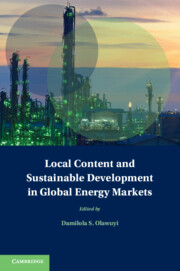Book contents
- Local Content and Sustainable Development in Global Energy Markets
- Reviews
- Treaty Implementation for Sustainable Development
- Local Content and Sustainable Development in Global Energy Markets
- Copyright page
- Contents
- Preface and Acknowledgements
- Abbreviations
- Editor
- Contributors
- Part I Introductory Context and Principles
- 1 Local Content and the Sustainable Development Nexus
- 2 Defining the ‘Local’ in Local Content Requirements in the Oil and Gas Sector
- 3 Local Content Measures and the WTO Regime: Addressing Contentions and Trade-offs
- 4 Local Content Requirements in Extractive Industries: A Human Rights Analysis
- 5 Upgrade of Local Suppliers in the Global Production Network: The Success or Otherwise of Local Content Regimes
- Part II Case Studies
- Part III Lessons Learned and Future Directions
- Index
3 - Local Content Measures and the WTO Regime: Addressing Contentions and Trade-offs
from Part I - Introductory Context and Principles
Published online by Cambridge University Press: 05 March 2021
- Local Content and Sustainable Development in Global Energy Markets
- Reviews
- Treaty Implementation for Sustainable Development
- Local Content and Sustainable Development in Global Energy Markets
- Copyright page
- Contents
- Preface and Acknowledgements
- Abbreviations
- Editor
- Contributors
- Part I Introductory Context and Principles
- 1 Local Content and the Sustainable Development Nexus
- 2 Defining the ‘Local’ in Local Content Requirements in the Oil and Gas Sector
- 3 Local Content Measures and the WTO Regime: Addressing Contentions and Trade-offs
- 4 Local Content Requirements in Extractive Industries: A Human Rights Analysis
- 5 Upgrade of Local Suppliers in the Global Production Network: The Success or Otherwise of Local Content Regimes
- Part II Case Studies
- Part III Lessons Learned and Future Directions
- Index
Summary
This chapter focuses on the use of local content requirements (LCRs) in renewable energy support policies and analyzes how current WTO rules discipline the use of LCRs. First, it unpacks the nature, scope, and forms of LCRs that have been established at the global level as well as the underlying rationale why governments find LCRs increasingly appealing. Secondly, it proceeds to analyze the interaction between the use of LCRs and the WTO regime by examining the existing WTO jurisprudence concerning LCRs adopted in the renewable energy sector. Various WTO rules come into play, in particular the GATT, the SCM Agreement, and the TRIMs Agreement. The WTO adjudicating bodies have sent a clear message that the use of LCRs in the renewable energy sector can rarely survive the scrutiny of the WTO rules, although there might be limited policy space under the current WTO regime that specifically crafted LCRs can be allowed. For governments, particularly these in emerging and developing economies that face urgent need to develop renewable energy, design and implementation of renewable energy LCRs in a WTO-consistent manner becomes crucial. It then critically assesses the stringent discipline imposed by the WTO regime against the use of LCRs in the renewable energy sector and the implications from climate and sustainable development perspectives.
- Type
- Chapter
- Information
- Publisher: Cambridge University PressPrint publication year: 2021



